Impact of Leadership and Culture on BBC's Organizational Behavior
VerifiedAdded on 2020/06/04
|13
|3856
|108
Report
AI Summary
This report provides an analysis of the organizational behavior within the British Broadcasting Corporation (BBC). It begins with an examination of organizational culture through the lens of Handy's cultural typology, discussing the influence of power and politics on the BBC's culture, particularly in the context of recent controversies and reforms. The report then delves into motivational theories, comparing content and process theories and evaluating their potential impact on employee effectiveness and organizational goal achievement within the BBC. Furthermore, it explores different types of teams within the BBC and the significance of effective teamwork, referencing Tuckman's team development theory. The report concludes by applying organizational concepts like path-goal theory to enhance team performance and productivity, while also identifying barriers to effective performance within the BBC.
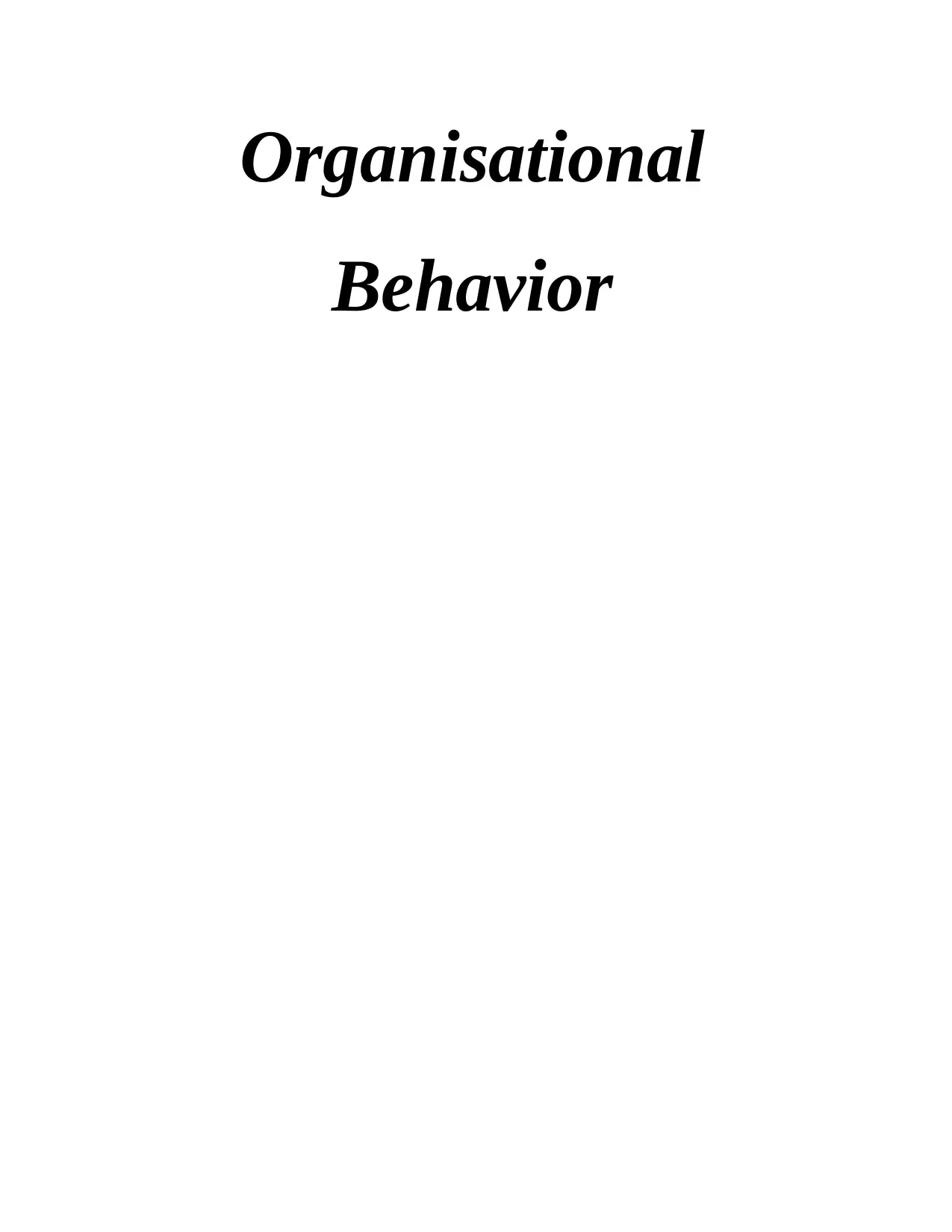
Organisational
Behavior
Behavior
Paraphrase This Document
Need a fresh take? Get an instant paraphrase of this document with our AI Paraphraser
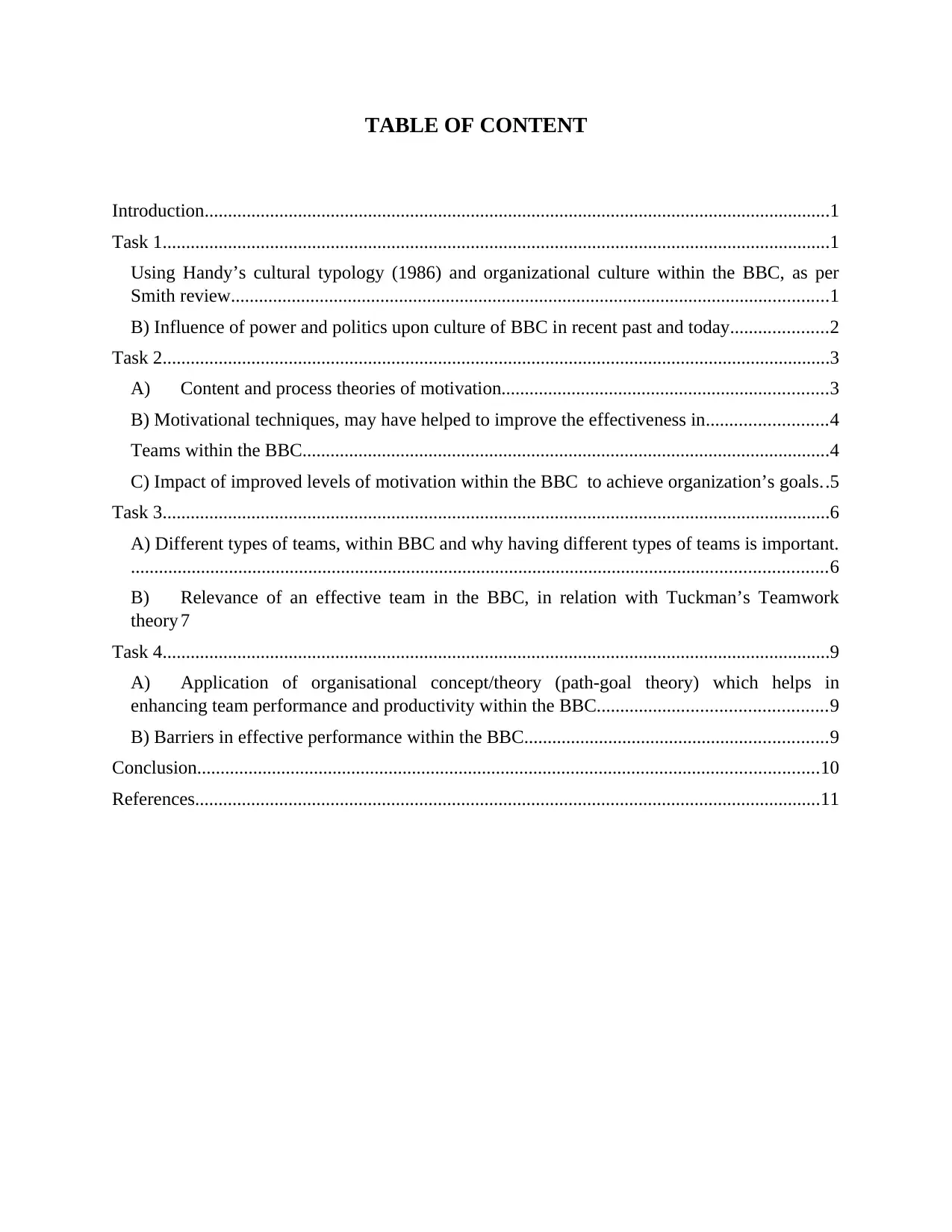
TABLE OF CONTENT
Introduction......................................................................................................................................1
Task 1...............................................................................................................................................1
Using Handy’s cultural typology (1986) and organizational culture within the BBC, as per
Smith review................................................................................................................................1
B) Influence of power and politics upon culture of BBC in recent past and today.....................2
Task 2...............................................................................................................................................3
A) Content and process theories of motivation......................................................................3
B) Motivational techniques, may have helped to improve the effectiveness in..........................4
Teams within the BBC.................................................................................................................4
C) Impact of improved levels of motivation within the BBC to achieve organization’s goals..5
Task 3...............................................................................................................................................6
A) Different types of teams, within BBC and why having different types of teams is important.
.....................................................................................................................................................6
B) Relevance of an effective team in the BBC, in relation with Tuckman’s Teamwork
theory 7
Task 4...............................................................................................................................................9
A) Application of organisational concept/theory (path-goal theory) which helps in
enhancing team performance and productivity within the BBC.................................................9
B) Barriers in effective performance within the BBC.................................................................9
Conclusion.....................................................................................................................................10
References......................................................................................................................................11
Introduction......................................................................................................................................1
Task 1...............................................................................................................................................1
Using Handy’s cultural typology (1986) and organizational culture within the BBC, as per
Smith review................................................................................................................................1
B) Influence of power and politics upon culture of BBC in recent past and today.....................2
Task 2...............................................................................................................................................3
A) Content and process theories of motivation......................................................................3
B) Motivational techniques, may have helped to improve the effectiveness in..........................4
Teams within the BBC.................................................................................................................4
C) Impact of improved levels of motivation within the BBC to achieve organization’s goals..5
Task 3...............................................................................................................................................6
A) Different types of teams, within BBC and why having different types of teams is important.
.....................................................................................................................................................6
B) Relevance of an effective team in the BBC, in relation with Tuckman’s Teamwork
theory 7
Task 4...............................................................................................................................................9
A) Application of organisational concept/theory (path-goal theory) which helps in
enhancing team performance and productivity within the BBC.................................................9
B) Barriers in effective performance within the BBC.................................................................9
Conclusion.....................................................................................................................................10
References......................................................................................................................................11
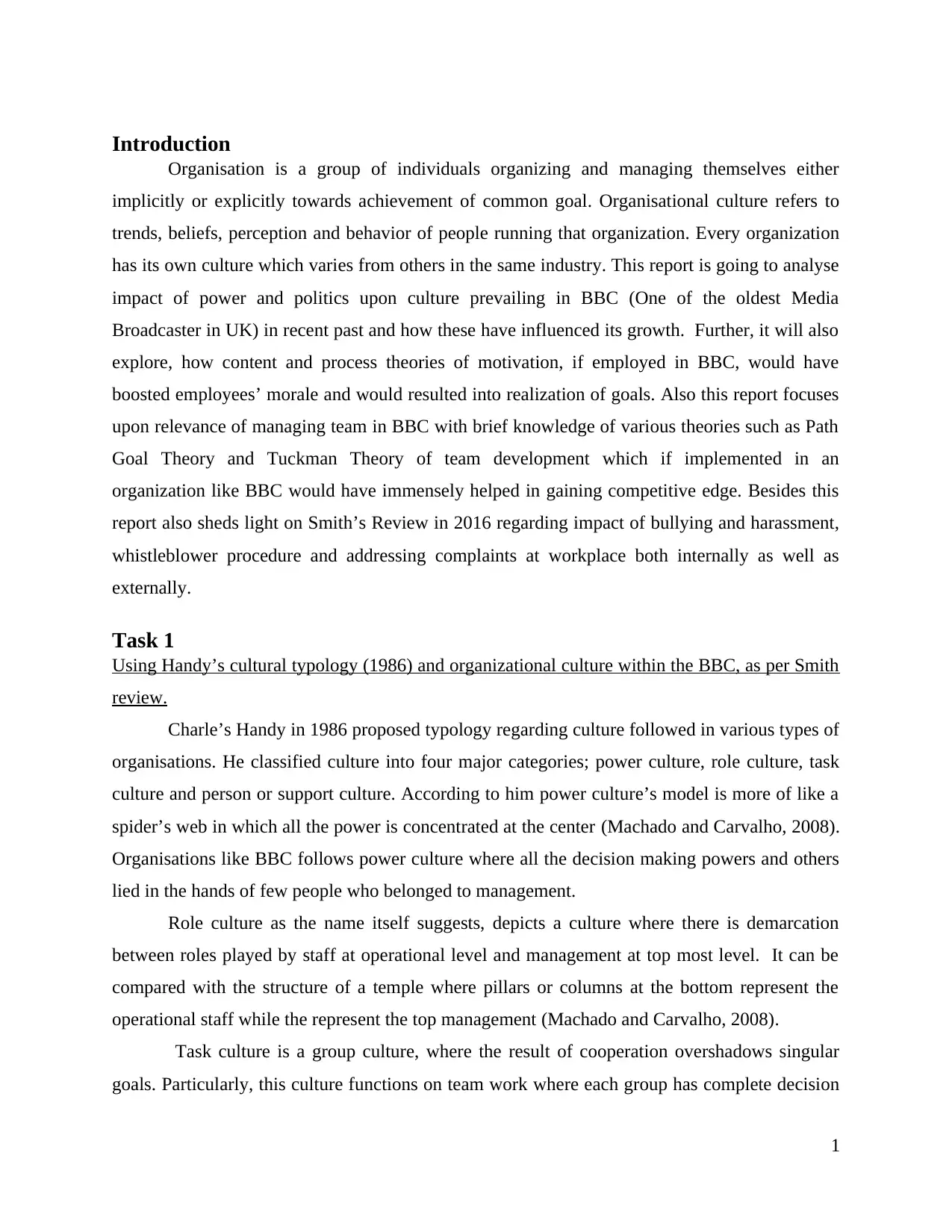
Introduction
Organisation is a group of individuals organizing and managing themselves either
implicitly or explicitly towards achievement of common goal. Organisational culture refers to
trends, beliefs, perception and behavior of people running that organization. Every organization
has its own culture which varies from others in the same industry. This report is going to analyse
impact of power and politics upon culture prevailing in BBC (One of the oldest Media
Broadcaster in UK) in recent past and how these have influenced its growth. Further, it will also
explore, how content and process theories of motivation, if employed in BBC, would have
boosted employees’ morale and would resulted into realization of goals. Also this report focuses
upon relevance of managing team in BBC with brief knowledge of various theories such as Path
Goal Theory and Tuckman Theory of team development which if implemented in an
organization like BBC would have immensely helped in gaining competitive edge. Besides this
report also sheds light on Smith’s Review in 2016 regarding impact of bullying and harassment,
whistleblower procedure and addressing complaints at workplace both internally as well as
externally.
Task 1
Using Handy’s cultural typology (1986) and organizational culture within the BBC, as per Smith
review.
Charle’s Handy in 1986 proposed typology regarding culture followed in various types of
organisations. He classified culture into four major categories; power culture, role culture, task
culture and person or support culture. According to him power culture’s model is more of like a
spider’s web in which all the power is concentrated at the center (Machado and Carvalho, 2008).
Organisations like BBC follows power culture where all the decision making powers and others
lied in the hands of few people who belonged to management.
Role culture as the name itself suggests, depicts a culture where there is demarcation
between roles played by staff at operational level and management at top most level. It can be
compared with the structure of a temple where pillars or columns at the bottom represent the
operational staff while the represent the top management (Machado and Carvalho, 2008).
Task culture is a group culture, where the result of cooperation overshadows singular
goals. Particularly, this culture functions on team work where each group has complete decision
1
Organisation is a group of individuals organizing and managing themselves either
implicitly or explicitly towards achievement of common goal. Organisational culture refers to
trends, beliefs, perception and behavior of people running that organization. Every organization
has its own culture which varies from others in the same industry. This report is going to analyse
impact of power and politics upon culture prevailing in BBC (One of the oldest Media
Broadcaster in UK) in recent past and how these have influenced its growth. Further, it will also
explore, how content and process theories of motivation, if employed in BBC, would have
boosted employees’ morale and would resulted into realization of goals. Also this report focuses
upon relevance of managing team in BBC with brief knowledge of various theories such as Path
Goal Theory and Tuckman Theory of team development which if implemented in an
organization like BBC would have immensely helped in gaining competitive edge. Besides this
report also sheds light on Smith’s Review in 2016 regarding impact of bullying and harassment,
whistleblower procedure and addressing complaints at workplace both internally as well as
externally.
Task 1
Using Handy’s cultural typology (1986) and organizational culture within the BBC, as per Smith
review.
Charle’s Handy in 1986 proposed typology regarding culture followed in various types of
organisations. He classified culture into four major categories; power culture, role culture, task
culture and person or support culture. According to him power culture’s model is more of like a
spider’s web in which all the power is concentrated at the center (Machado and Carvalho, 2008).
Organisations like BBC follows power culture where all the decision making powers and others
lied in the hands of few people who belonged to management.
Role culture as the name itself suggests, depicts a culture where there is demarcation
between roles played by staff at operational level and management at top most level. It can be
compared with the structure of a temple where pillars or columns at the bottom represent the
operational staff while the represent the top management (Machado and Carvalho, 2008).
Task culture is a group culture, where the result of cooperation overshadows singular
goals. Particularly, this culture functions on team work where each group has complete decision
1
⊘ This is a preview!⊘
Do you want full access?
Subscribe today to unlock all pages.

Trusted by 1+ million students worldwide
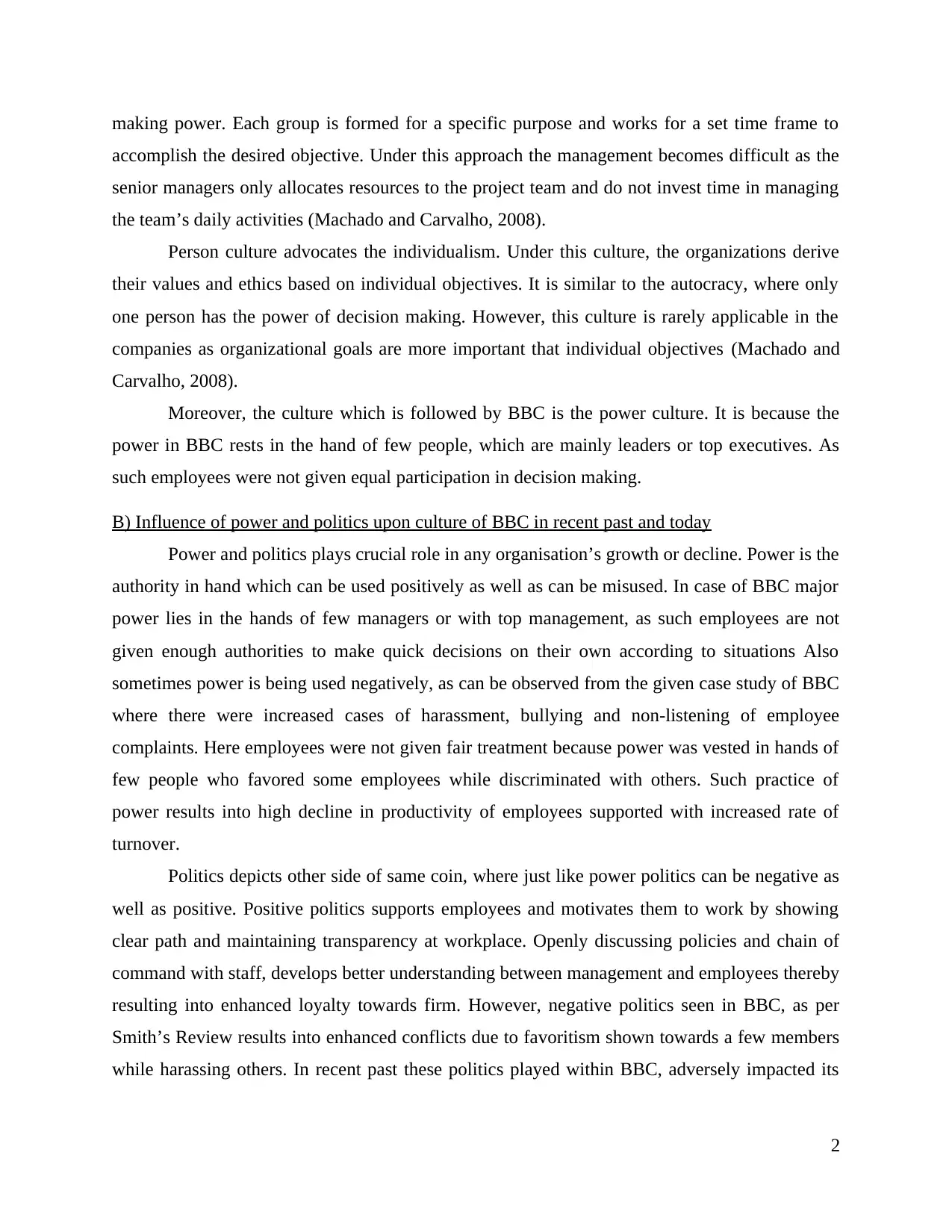
making power. Each group is formed for a specific purpose and works for a set time frame to
accomplish the desired objective. Under this approach the management becomes difficult as the
senior managers only allocates resources to the project team and do not invest time in managing
the team’s daily activities (Machado and Carvalho, 2008).
Person culture advocates the individualism. Under this culture, the organizations derive
their values and ethics based on individual objectives. It is similar to the autocracy, where only
one person has the power of decision making. However, this culture is rarely applicable in the
companies as organizational goals are more important that individual objectives (Machado and
Carvalho, 2008).
Moreover, the culture which is followed by BBC is the power culture. It is because the
power in BBC rests in the hand of few people, which are mainly leaders or top executives. As
such employees were not given equal participation in decision making.
B) Influence of power and politics upon culture of BBC in recent past and today
Power and politics plays crucial role in any organisation’s growth or decline. Power is the
authority in hand which can be used positively as well as can be misused. In case of BBC major
power lies in the hands of few managers or with top management, as such employees are not
given enough authorities to make quick decisions on their own according to situations Also
sometimes power is being used negatively, as can be observed from the given case study of BBC
where there were increased cases of harassment, bullying and non-listening of employee
complaints. Here employees were not given fair treatment because power was vested in hands of
few people who favored some employees while discriminated with others. Such practice of
power results into high decline in productivity of employees supported with increased rate of
turnover.
Politics depicts other side of same coin, where just like power politics can be negative as
well as positive. Positive politics supports employees and motivates them to work by showing
clear path and maintaining transparency at workplace. Openly discussing policies and chain of
command with staff, develops better understanding between management and employees thereby
resulting into enhanced loyalty towards firm. However, negative politics seen in BBC, as per
Smith’s Review results into enhanced conflicts due to favoritism shown towards a few members
while harassing others. In recent past these politics played within BBC, adversely impacted its
2
accomplish the desired objective. Under this approach the management becomes difficult as the
senior managers only allocates resources to the project team and do not invest time in managing
the team’s daily activities (Machado and Carvalho, 2008).
Person culture advocates the individualism. Under this culture, the organizations derive
their values and ethics based on individual objectives. It is similar to the autocracy, where only
one person has the power of decision making. However, this culture is rarely applicable in the
companies as organizational goals are more important that individual objectives (Machado and
Carvalho, 2008).
Moreover, the culture which is followed by BBC is the power culture. It is because the
power in BBC rests in the hand of few people, which are mainly leaders or top executives. As
such employees were not given equal participation in decision making.
B) Influence of power and politics upon culture of BBC in recent past and today
Power and politics plays crucial role in any organisation’s growth or decline. Power is the
authority in hand which can be used positively as well as can be misused. In case of BBC major
power lies in the hands of few managers or with top management, as such employees are not
given enough authorities to make quick decisions on their own according to situations Also
sometimes power is being used negatively, as can be observed from the given case study of BBC
where there were increased cases of harassment, bullying and non-listening of employee
complaints. Here employees were not given fair treatment because power was vested in hands of
few people who favored some employees while discriminated with others. Such practice of
power results into high decline in productivity of employees supported with increased rate of
turnover.
Politics depicts other side of same coin, where just like power politics can be negative as
well as positive. Positive politics supports employees and motivates them to work by showing
clear path and maintaining transparency at workplace. Openly discussing policies and chain of
command with staff, develops better understanding between management and employees thereby
resulting into enhanced loyalty towards firm. However, negative politics seen in BBC, as per
Smith’s Review results into enhanced conflicts due to favoritism shown towards a few members
while harassing others. In recent past these politics played within BBC, adversely impacted its
2
Paraphrase This Document
Need a fresh take? Get an instant paraphrase of this document with our AI Paraphraser
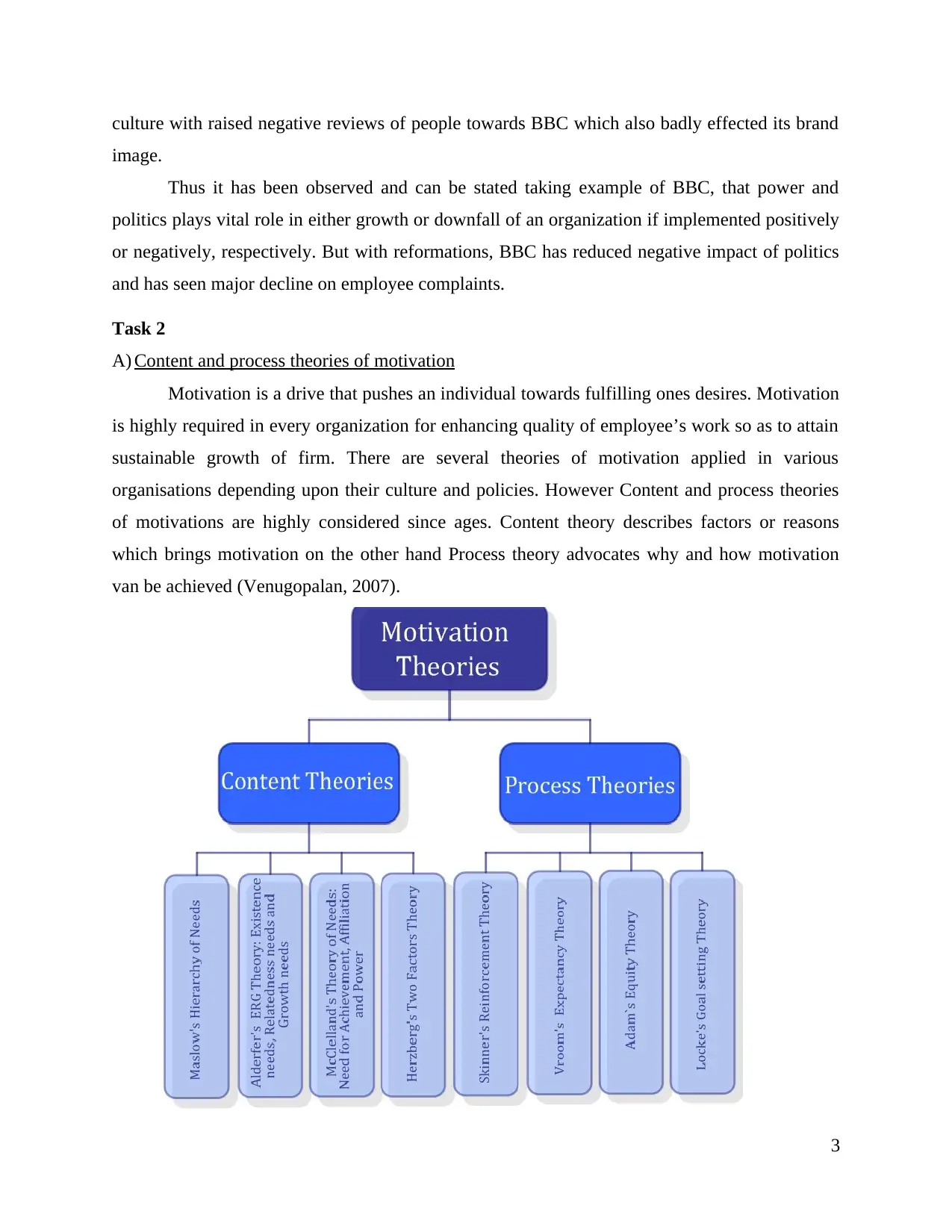
culture with raised negative reviews of people towards BBC which also badly effected its brand
image.
Thus it has been observed and can be stated taking example of BBC, that power and
politics plays vital role in either growth or downfall of an organization if implemented positively
or negatively, respectively. But with reformations, BBC has reduced negative impact of politics
and has seen major decline on employee complaints.
Task 2
A) Content and process theories of motivation
Motivation is a drive that pushes an individual towards fulfilling ones desires. Motivation
is highly required in every organization for enhancing quality of employee’s work so as to attain
sustainable growth of firm. There are several theories of motivation applied in various
organisations depending upon their culture and policies. However Content and process theories
of motivations are highly considered since ages. Content theory describes factors or reasons
which brings motivation on the other hand Process theory advocates why and how motivation
van be achieved (Venugopalan, 2007).
3
image.
Thus it has been observed and can be stated taking example of BBC, that power and
politics plays vital role in either growth or downfall of an organization if implemented positively
or negatively, respectively. But with reformations, BBC has reduced negative impact of politics
and has seen major decline on employee complaints.
Task 2
A) Content and process theories of motivation
Motivation is a drive that pushes an individual towards fulfilling ones desires. Motivation
is highly required in every organization for enhancing quality of employee’s work so as to attain
sustainable growth of firm. There are several theories of motivation applied in various
organisations depending upon their culture and policies. However Content and process theories
of motivations are highly considered since ages. Content theory describes factors or reasons
which brings motivation on the other hand Process theory advocates why and how motivation
van be achieved (Venugopalan, 2007).
3
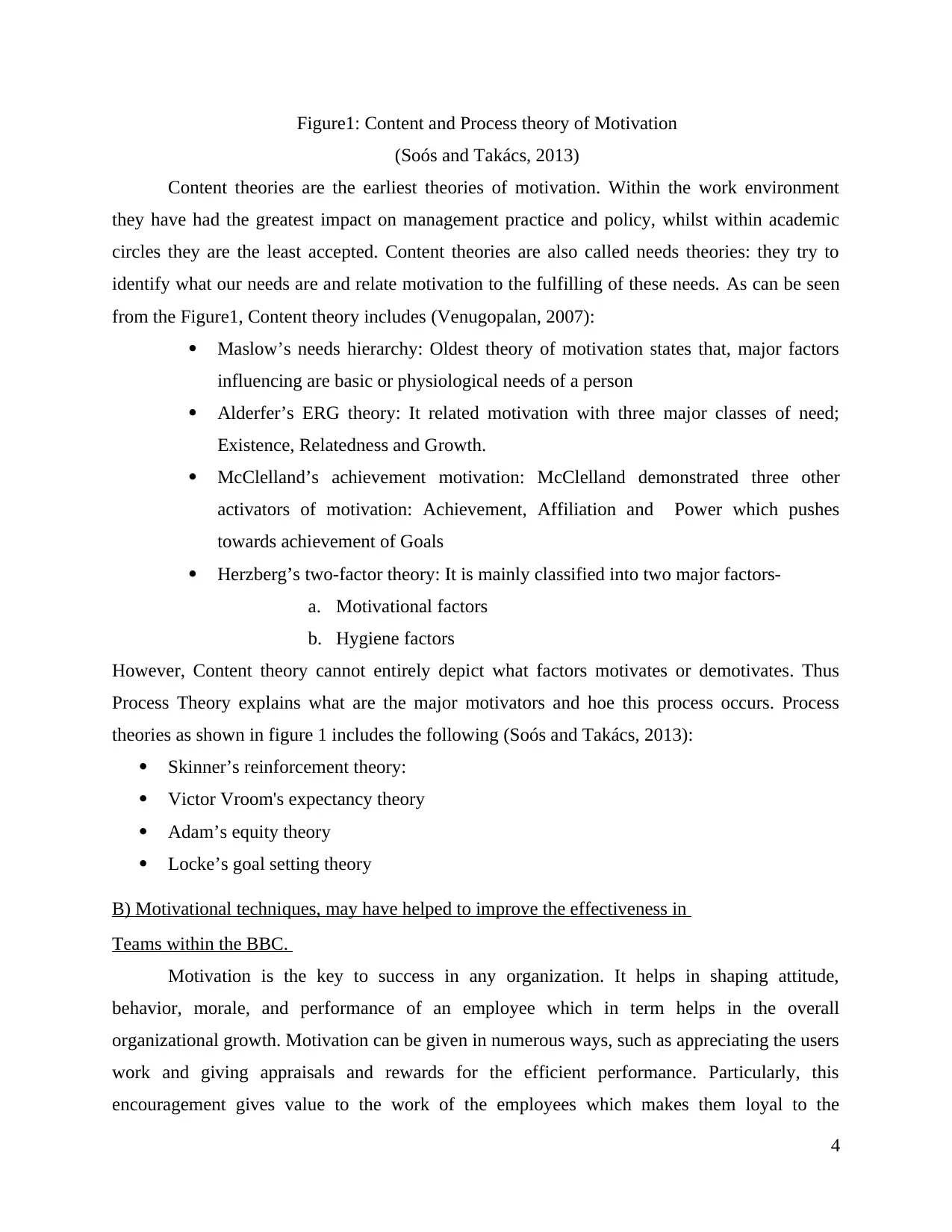
Figure1: Content and Process theory of Motivation
(Soós and Takács, 2013)
Content theories are the earliest theories of motivation. Within the work environment
they have had the greatest impact on management practice and policy, whilst within academic
circles they are the least accepted. Content theories are also called needs theories: they try to
identify what our needs are and relate motivation to the fulfilling of these needs. As can be seen
from the Figure1, Content theory includes (Venugopalan, 2007):
Maslow’s needs hierarchy: Oldest theory of motivation states that, major factors
influencing are basic or physiological needs of a person
Alderfer’s ERG theory: It related motivation with three major classes of need;
Existence, Relatedness and Growth.
McClelland’s achievement motivation: McClelland demonstrated three other
activators of motivation: Achievement, Affiliation and Power which pushes
towards achievement of Goals
Herzberg’s two-factor theory: It is mainly classified into two major factors-
a. Motivational factors
b. Hygiene factors
However, Content theory cannot entirely depict what factors motivates or demotivates. Thus
Process Theory explains what are the major motivators and hoe this process occurs. Process
theories as shown in figure 1 includes the following (Soós and Takács, 2013):
Skinner’s reinforcement theory:
Victor Vroom's expectancy theory
Adam’s equity theory
Locke’s goal setting theory
B) Motivational techniques, may have helped to improve the effectiveness in
Teams within the BBC.
Motivation is the key to success in any organization. It helps in shaping attitude,
behavior, morale, and performance of an employee which in term helps in the overall
organizational growth. Motivation can be given in numerous ways, such as appreciating the users
work and giving appraisals and rewards for the efficient performance. Particularly, this
encouragement gives value to the work of the employees which makes them loyal to the
4
(Soós and Takács, 2013)
Content theories are the earliest theories of motivation. Within the work environment
they have had the greatest impact on management practice and policy, whilst within academic
circles they are the least accepted. Content theories are also called needs theories: they try to
identify what our needs are and relate motivation to the fulfilling of these needs. As can be seen
from the Figure1, Content theory includes (Venugopalan, 2007):
Maslow’s needs hierarchy: Oldest theory of motivation states that, major factors
influencing are basic or physiological needs of a person
Alderfer’s ERG theory: It related motivation with three major classes of need;
Existence, Relatedness and Growth.
McClelland’s achievement motivation: McClelland demonstrated three other
activators of motivation: Achievement, Affiliation and Power which pushes
towards achievement of Goals
Herzberg’s two-factor theory: It is mainly classified into two major factors-
a. Motivational factors
b. Hygiene factors
However, Content theory cannot entirely depict what factors motivates or demotivates. Thus
Process Theory explains what are the major motivators and hoe this process occurs. Process
theories as shown in figure 1 includes the following (Soós and Takács, 2013):
Skinner’s reinforcement theory:
Victor Vroom's expectancy theory
Adam’s equity theory
Locke’s goal setting theory
B) Motivational techniques, may have helped to improve the effectiveness in
Teams within the BBC.
Motivation is the key to success in any organization. It helps in shaping attitude,
behavior, morale, and performance of an employee which in term helps in the overall
organizational growth. Motivation can be given in numerous ways, such as appreciating the users
work and giving appraisals and rewards for the efficient performance. Particularly, this
encouragement gives value to the work of the employees which makes them loyal to the
4
⊘ This is a preview!⊘
Do you want full access?
Subscribe today to unlock all pages.

Trusted by 1+ million students worldwide
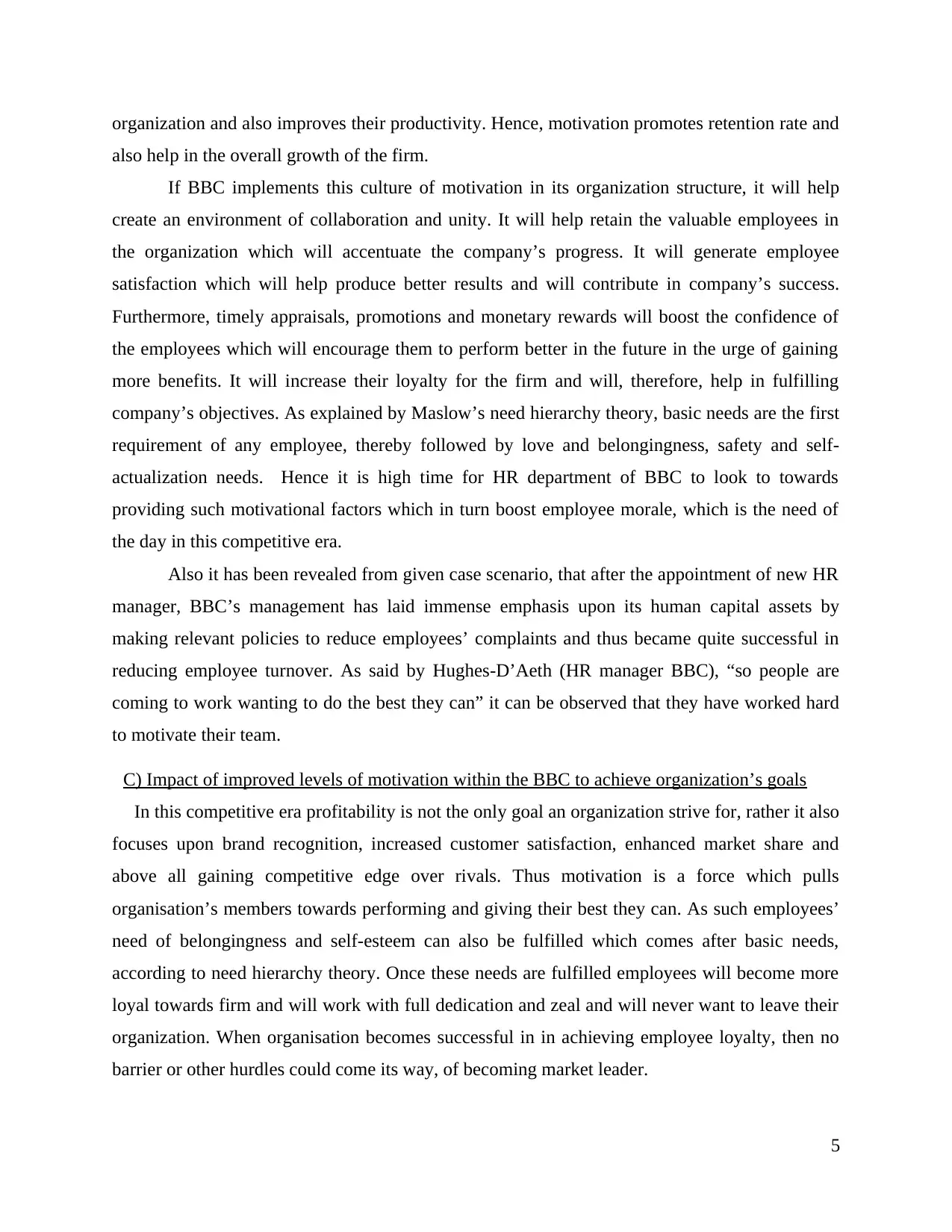
organization and also improves their productivity. Hence, motivation promotes retention rate and
also help in the overall growth of the firm.
If BBC implements this culture of motivation in its organization structure, it will help
create an environment of collaboration and unity. It will help retain the valuable employees in
the organization which will accentuate the company’s progress. It will generate employee
satisfaction which will help produce better results and will contribute in company’s success.
Furthermore, timely appraisals, promotions and monetary rewards will boost the confidence of
the employees which will encourage them to perform better in the future in the urge of gaining
more benefits. It will increase their loyalty for the firm and will, therefore, help in fulfilling
company’s objectives. As explained by Maslow’s need hierarchy theory, basic needs are the first
requirement of any employee, thereby followed by love and belongingness, safety and self-
actualization needs. Hence it is high time for HR department of BBC to look to towards
providing such motivational factors which in turn boost employee morale, which is the need of
the day in this competitive era.
Also it has been revealed from given case scenario, that after the appointment of new HR
manager, BBC’s management has laid immense emphasis upon its human capital assets by
making relevant policies to reduce employees’ complaints and thus became quite successful in
reducing employee turnover. As said by Hughes-D’Aeth (HR manager BBC), “so people are
coming to work wanting to do the best they can” it can be observed that they have worked hard
to motivate their team.
C) Impact of improved levels of motivation within the BBC to achieve organization’s goals
In this competitive era profitability is not the only goal an organization strive for, rather it also
focuses upon brand recognition, increased customer satisfaction, enhanced market share and
above all gaining competitive edge over rivals. Thus motivation is a force which pulls
organisation’s members towards performing and giving their best they can. As such employees’
need of belongingness and self-esteem can also be fulfilled which comes after basic needs,
according to need hierarchy theory. Once these needs are fulfilled employees will become more
loyal towards firm and will work with full dedication and zeal and will never want to leave their
organization. When organisation becomes successful in in achieving employee loyalty, then no
barrier or other hurdles could come its way, of becoming market leader.
5
also help in the overall growth of the firm.
If BBC implements this culture of motivation in its organization structure, it will help
create an environment of collaboration and unity. It will help retain the valuable employees in
the organization which will accentuate the company’s progress. It will generate employee
satisfaction which will help produce better results and will contribute in company’s success.
Furthermore, timely appraisals, promotions and monetary rewards will boost the confidence of
the employees which will encourage them to perform better in the future in the urge of gaining
more benefits. It will increase their loyalty for the firm and will, therefore, help in fulfilling
company’s objectives. As explained by Maslow’s need hierarchy theory, basic needs are the first
requirement of any employee, thereby followed by love and belongingness, safety and self-
actualization needs. Hence it is high time for HR department of BBC to look to towards
providing such motivational factors which in turn boost employee morale, which is the need of
the day in this competitive era.
Also it has been revealed from given case scenario, that after the appointment of new HR
manager, BBC’s management has laid immense emphasis upon its human capital assets by
making relevant policies to reduce employees’ complaints and thus became quite successful in
reducing employee turnover. As said by Hughes-D’Aeth (HR manager BBC), “so people are
coming to work wanting to do the best they can” it can be observed that they have worked hard
to motivate their team.
C) Impact of improved levels of motivation within the BBC to achieve organization’s goals
In this competitive era profitability is not the only goal an organization strive for, rather it also
focuses upon brand recognition, increased customer satisfaction, enhanced market share and
above all gaining competitive edge over rivals. Thus motivation is a force which pulls
organisation’s members towards performing and giving their best they can. As such employees’
need of belongingness and self-esteem can also be fulfilled which comes after basic needs,
according to need hierarchy theory. Once these needs are fulfilled employees will become more
loyal towards firm and will work with full dedication and zeal and will never want to leave their
organization. When organisation becomes successful in in achieving employee loyalty, then no
barrier or other hurdles could come its way, of becoming market leader.
5
Paraphrase This Document
Need a fresh take? Get an instant paraphrase of this document with our AI Paraphraser
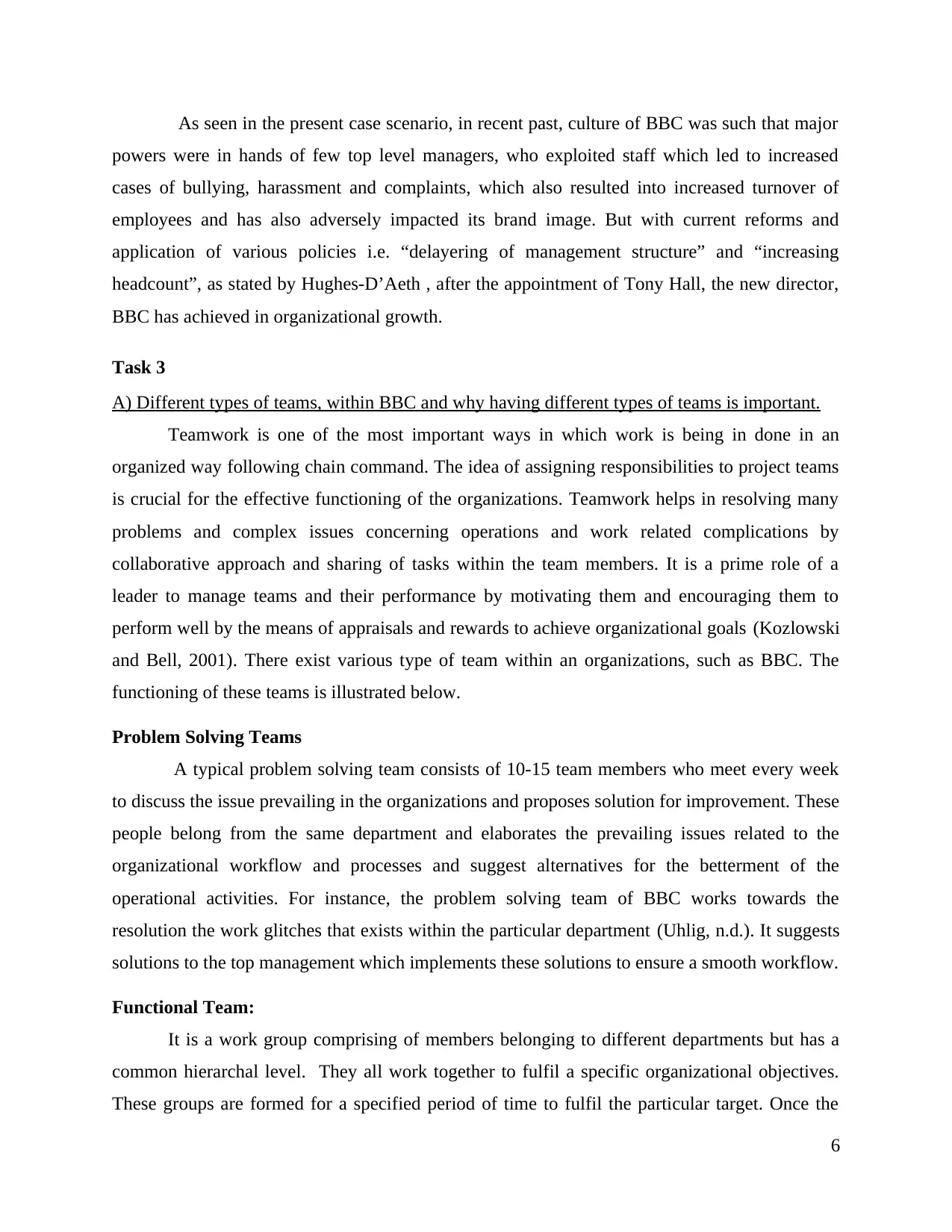
As seen in the present case scenario, in recent past, culture of BBC was such that major
powers were in hands of few top level managers, who exploited staff which led to increased
cases of bullying, harassment and complaints, which also resulted into increased turnover of
employees and has also adversely impacted its brand image. But with current reforms and
application of various policies i.e. “delayering of management structure” and “increasing
headcount”, as stated by Hughes-D’Aeth , after the appointment of Tony Hall, the new director,
BBC has achieved in organizational growth.
Task 3
A) Different types of teams, within BBC and why having different types of teams is important.
Teamwork is one of the most important ways in which work is being in done in an
organized way following chain command. The idea of assigning responsibilities to project teams
is crucial for the effective functioning of the organizations. Teamwork helps in resolving many
problems and complex issues concerning operations and work related complications by
collaborative approach and sharing of tasks within the team members. It is a prime role of a
leader to manage teams and their performance by motivating them and encouraging them to
perform well by the means of appraisals and rewards to achieve organizational goals (Kozlowski
and Bell, 2001). There exist various type of team within an organizations, such as BBC. The
functioning of these teams is illustrated below.
Problem Solving Teams
A typical problem solving team consists of 10-15 team members who meet every week
to discuss the issue prevailing in the organizations and proposes solution for improvement. These
people belong from the same department and elaborates the prevailing issues related to the
organizational workflow and processes and suggest alternatives for the betterment of the
operational activities. For instance, the problem solving team of BBC works towards the
resolution the work glitches that exists within the particular department (Uhlig, n.d.). It suggests
solutions to the top management which implements these solutions to ensure a smooth workflow.
Functional Team:
It is a work group comprising of members belonging to different departments but has a
common hierarchal level. They all work together to fulfil a specific organizational objectives.
These groups are formed for a specified period of time to fulfil the particular target. Once the
6
powers were in hands of few top level managers, who exploited staff which led to increased
cases of bullying, harassment and complaints, which also resulted into increased turnover of
employees and has also adversely impacted its brand image. But with current reforms and
application of various policies i.e. “delayering of management structure” and “increasing
headcount”, as stated by Hughes-D’Aeth , after the appointment of Tony Hall, the new director,
BBC has achieved in organizational growth.
Task 3
A) Different types of teams, within BBC and why having different types of teams is important.
Teamwork is one of the most important ways in which work is being in done in an
organized way following chain command. The idea of assigning responsibilities to project teams
is crucial for the effective functioning of the organizations. Teamwork helps in resolving many
problems and complex issues concerning operations and work related complications by
collaborative approach and sharing of tasks within the team members. It is a prime role of a
leader to manage teams and their performance by motivating them and encouraging them to
perform well by the means of appraisals and rewards to achieve organizational goals (Kozlowski
and Bell, 2001). There exist various type of team within an organizations, such as BBC. The
functioning of these teams is illustrated below.
Problem Solving Teams
A typical problem solving team consists of 10-15 team members who meet every week
to discuss the issue prevailing in the organizations and proposes solution for improvement. These
people belong from the same department and elaborates the prevailing issues related to the
organizational workflow and processes and suggest alternatives for the betterment of the
operational activities. For instance, the problem solving team of BBC works towards the
resolution the work glitches that exists within the particular department (Uhlig, n.d.). It suggests
solutions to the top management which implements these solutions to ensure a smooth workflow.
Functional Team:
It is a work group comprising of members belonging to different departments but has a
common hierarchal level. They all work together to fulfil a specific organizational objectives.
These groups are formed for a specified period of time to fulfil the particular target. Once the
6
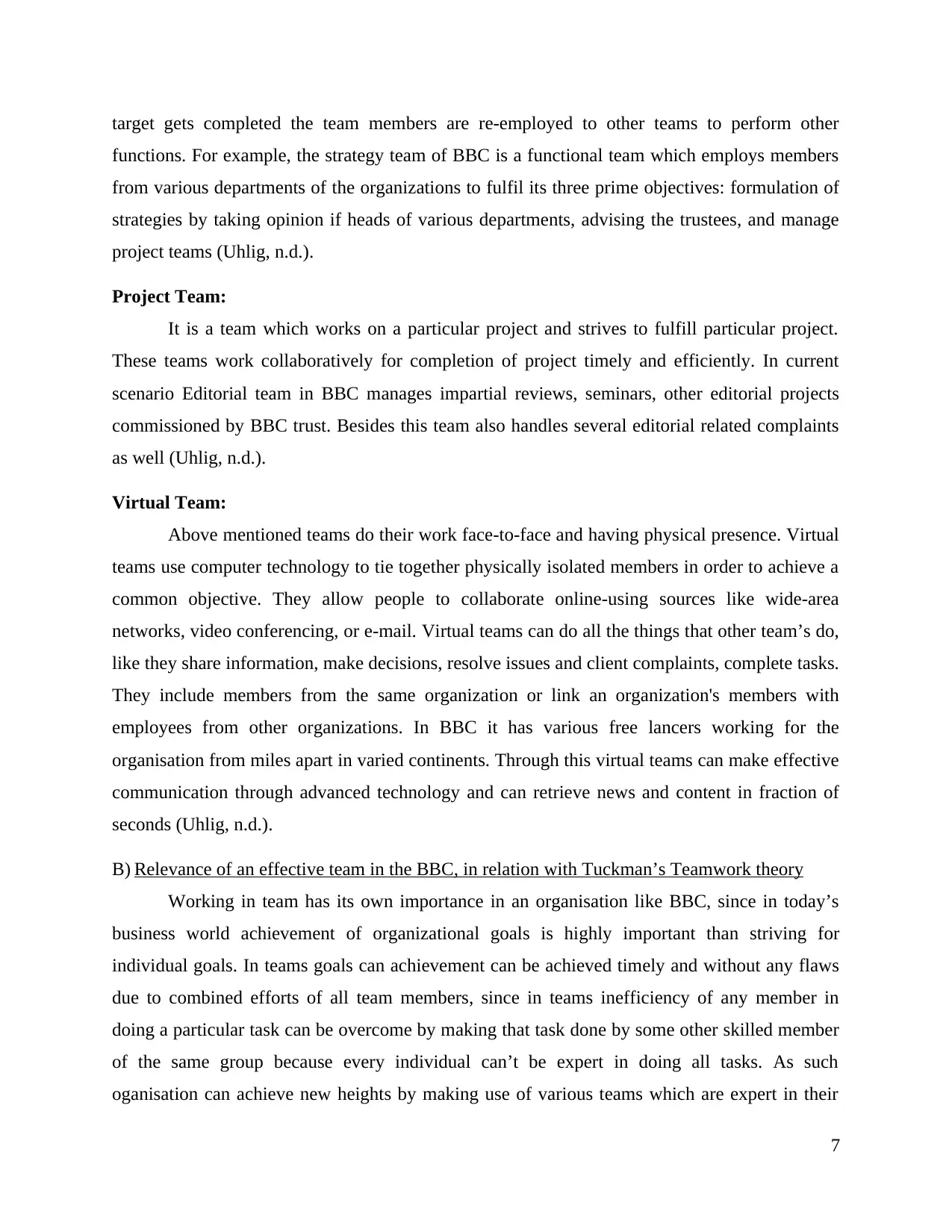
target gets completed the team members are re-employed to other teams to perform other
functions. For example, the strategy team of BBC is a functional team which employs members
from various departments of the organizations to fulfil its three prime objectives: formulation of
strategies by taking opinion if heads of various departments, advising the trustees, and manage
project teams (Uhlig, n.d.).
Project Team:
It is a team which works on a particular project and strives to fulfill particular project.
These teams work collaboratively for completion of project timely and efficiently. In current
scenario Editorial team in BBC manages impartial reviews, seminars, other editorial projects
commissioned by BBC trust. Besides this team also handles several editorial related complaints
as well (Uhlig, n.d.).
Virtual Team:
Above mentioned teams do their work face-to-face and having physical presence. Virtual
teams use computer technology to tie together physically isolated members in order to achieve a
common objective. They allow people to collaborate online-using sources like wide-area
networks, video conferencing, or e-mail. Virtual teams can do all the things that other team’s do,
like they share information, make decisions, resolve issues and client complaints, complete tasks.
They include members from the same organization or link an organization's members with
employees from other organizations. In BBC it has various free lancers working for the
organisation from miles apart in varied continents. Through this virtual teams can make effective
communication through advanced technology and can retrieve news and content in fraction of
seconds (Uhlig, n.d.).
B) Relevance of an effective team in the BBC, in relation with Tuckman’s Teamwork theory
Working in team has its own importance in an organisation like BBC, since in today’s
business world achievement of organizational goals is highly important than striving for
individual goals. In teams goals can achievement can be achieved timely and without any flaws
due to combined efforts of all team members, since in teams inefficiency of any member in
doing a particular task can be overcome by making that task done by some other skilled member
of the same group because every individual can’t be expert in doing all tasks. As such
oganisation can achieve new heights by making use of various teams which are expert in their
7
functions. For example, the strategy team of BBC is a functional team which employs members
from various departments of the organizations to fulfil its three prime objectives: formulation of
strategies by taking opinion if heads of various departments, advising the trustees, and manage
project teams (Uhlig, n.d.).
Project Team:
It is a team which works on a particular project and strives to fulfill particular project.
These teams work collaboratively for completion of project timely and efficiently. In current
scenario Editorial team in BBC manages impartial reviews, seminars, other editorial projects
commissioned by BBC trust. Besides this team also handles several editorial related complaints
as well (Uhlig, n.d.).
Virtual Team:
Above mentioned teams do their work face-to-face and having physical presence. Virtual
teams use computer technology to tie together physically isolated members in order to achieve a
common objective. They allow people to collaborate online-using sources like wide-area
networks, video conferencing, or e-mail. Virtual teams can do all the things that other team’s do,
like they share information, make decisions, resolve issues and client complaints, complete tasks.
They include members from the same organization or link an organization's members with
employees from other organizations. In BBC it has various free lancers working for the
organisation from miles apart in varied continents. Through this virtual teams can make effective
communication through advanced technology and can retrieve news and content in fraction of
seconds (Uhlig, n.d.).
B) Relevance of an effective team in the BBC, in relation with Tuckman’s Teamwork theory
Working in team has its own importance in an organisation like BBC, since in today’s
business world achievement of organizational goals is highly important than striving for
individual goals. In teams goals can achievement can be achieved timely and without any flaws
due to combined efforts of all team members, since in teams inefficiency of any member in
doing a particular task can be overcome by making that task done by some other skilled member
of the same group because every individual can’t be expert in doing all tasks. As such
oganisation can achieve new heights by making use of various teams which are expert in their
7
⊘ This is a preview!⊘
Do you want full access?
Subscribe today to unlock all pages.

Trusted by 1+ million students worldwide
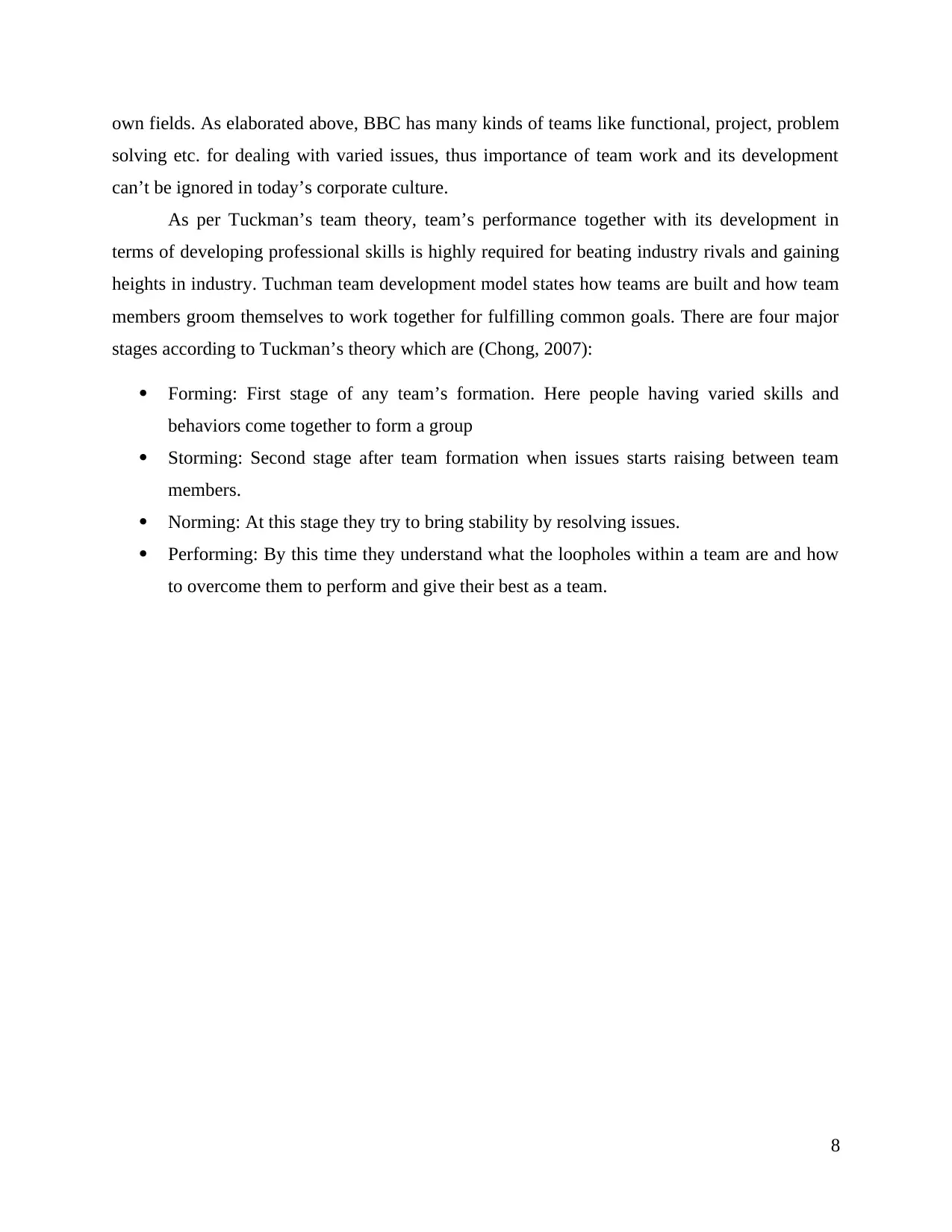
own fields. As elaborated above, BBC has many kinds of teams like functional, project, problem
solving etc. for dealing with varied issues, thus importance of team work and its development
can’t be ignored in today’s corporate culture.
As per Tuckman’s team theory, team’s performance together with its development in
terms of developing professional skills is highly required for beating industry rivals and gaining
heights in industry. Tuchman team development model states how teams are built and how team
members groom themselves to work together for fulfilling common goals. There are four major
stages according to Tuckman’s theory which are (Chong, 2007):
Forming: First stage of any team’s formation. Here people having varied skills and
behaviors come together to form a group
Storming: Second stage after team formation when issues starts raising between team
members.
Norming: At this stage they try to bring stability by resolving issues.
Performing: By this time they understand what the loopholes within a team are and how
to overcome them to perform and give their best as a team.
8
solving etc. for dealing with varied issues, thus importance of team work and its development
can’t be ignored in today’s corporate culture.
As per Tuckman’s team theory, team’s performance together with its development in
terms of developing professional skills is highly required for beating industry rivals and gaining
heights in industry. Tuchman team development model states how teams are built and how team
members groom themselves to work together for fulfilling common goals. There are four major
stages according to Tuckman’s theory which are (Chong, 2007):
Forming: First stage of any team’s formation. Here people having varied skills and
behaviors come together to form a group
Storming: Second stage after team formation when issues starts raising between team
members.
Norming: At this stage they try to bring stability by resolving issues.
Performing: By this time they understand what the loopholes within a team are and how
to overcome them to perform and give their best as a team.
8
Paraphrase This Document
Need a fresh take? Get an instant paraphrase of this document with our AI Paraphraser
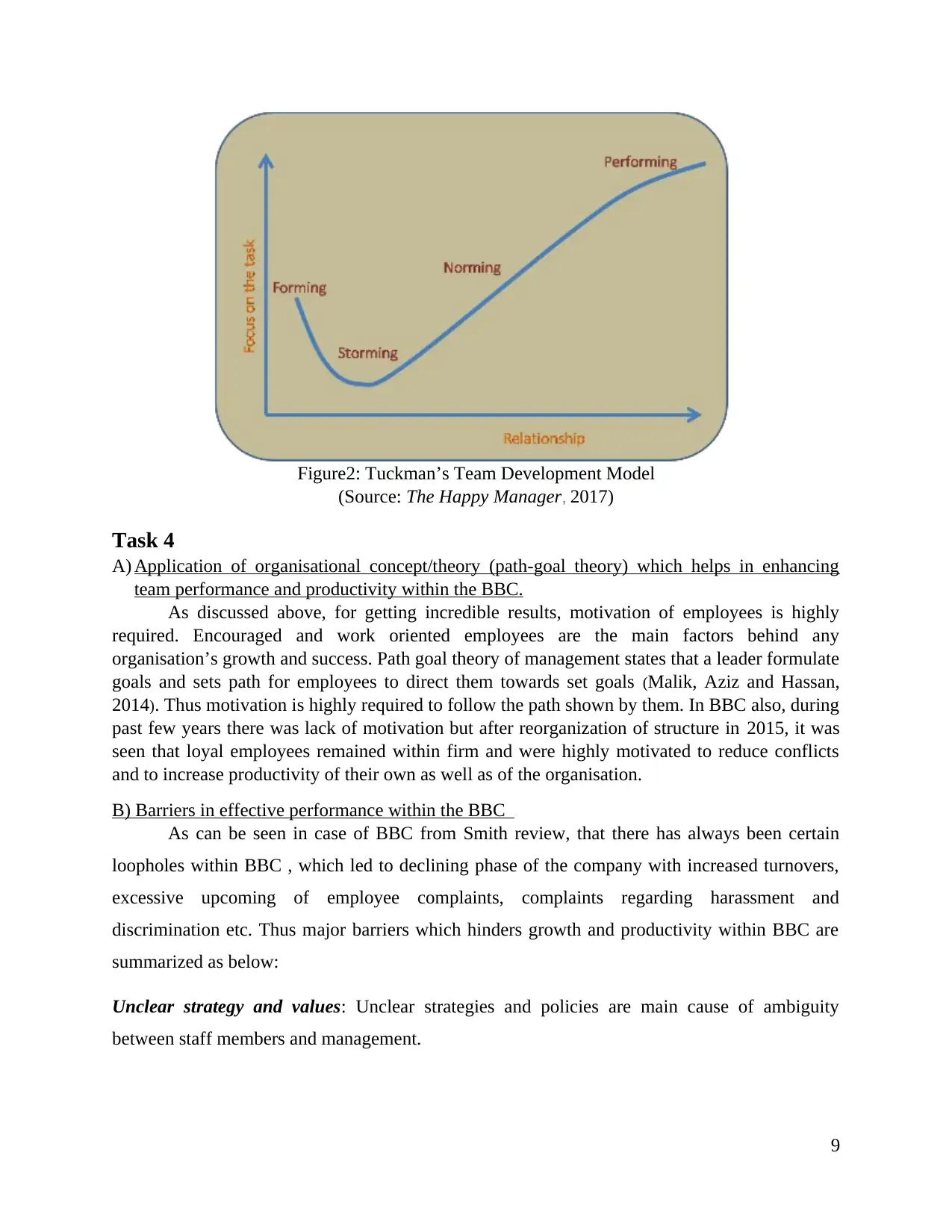
Figure2: Tuckman’s Team Development Model
(Source: The Happy Manager, 2017)
Task 4
A) Application of organisational concept/theory (path-goal theory) which helps in enhancing
team performance and productivity within the BBC.
As discussed above, for getting incredible results, motivation of employees is highly
required. Encouraged and work oriented employees are the main factors behind any
organisation’s growth and success. Path goal theory of management states that a leader formulate
goals and sets path for employees to direct them towards set goals (Malik, Aziz and Hassan,
2014). Thus motivation is highly required to follow the path shown by them. In BBC also, during
past few years there was lack of motivation but after reorganization of structure in 2015, it was
seen that loyal employees remained within firm and were highly motivated to reduce conflicts
and to increase productivity of their own as well as of the organisation.
B) Barriers in effective performance within the BBC
As can be seen in case of BBC from Smith review, that there has always been certain
loopholes within BBC , which led to declining phase of the company with increased turnovers,
excessive upcoming of employee complaints, complaints regarding harassment and
discrimination etc. Thus major barriers which hinders growth and productivity within BBC are
summarized as below:
Unclear strategy and values: Unclear strategies and policies are main cause of ambiguity
between staff members and management.
9
(Source: The Happy Manager, 2017)
Task 4
A) Application of organisational concept/theory (path-goal theory) which helps in enhancing
team performance and productivity within the BBC.
As discussed above, for getting incredible results, motivation of employees is highly
required. Encouraged and work oriented employees are the main factors behind any
organisation’s growth and success. Path goal theory of management states that a leader formulate
goals and sets path for employees to direct them towards set goals (Malik, Aziz and Hassan,
2014). Thus motivation is highly required to follow the path shown by them. In BBC also, during
past few years there was lack of motivation but after reorganization of structure in 2015, it was
seen that loyal employees remained within firm and were highly motivated to reduce conflicts
and to increase productivity of their own as well as of the organisation.
B) Barriers in effective performance within the BBC
As can be seen in case of BBC from Smith review, that there has always been certain
loopholes within BBC , which led to declining phase of the company with increased turnovers,
excessive upcoming of employee complaints, complaints regarding harassment and
discrimination etc. Thus major barriers which hinders growth and productivity within BBC are
summarized as below:
Unclear strategy and values: Unclear strategies and policies are main cause of ambiguity
between staff members and management.
9
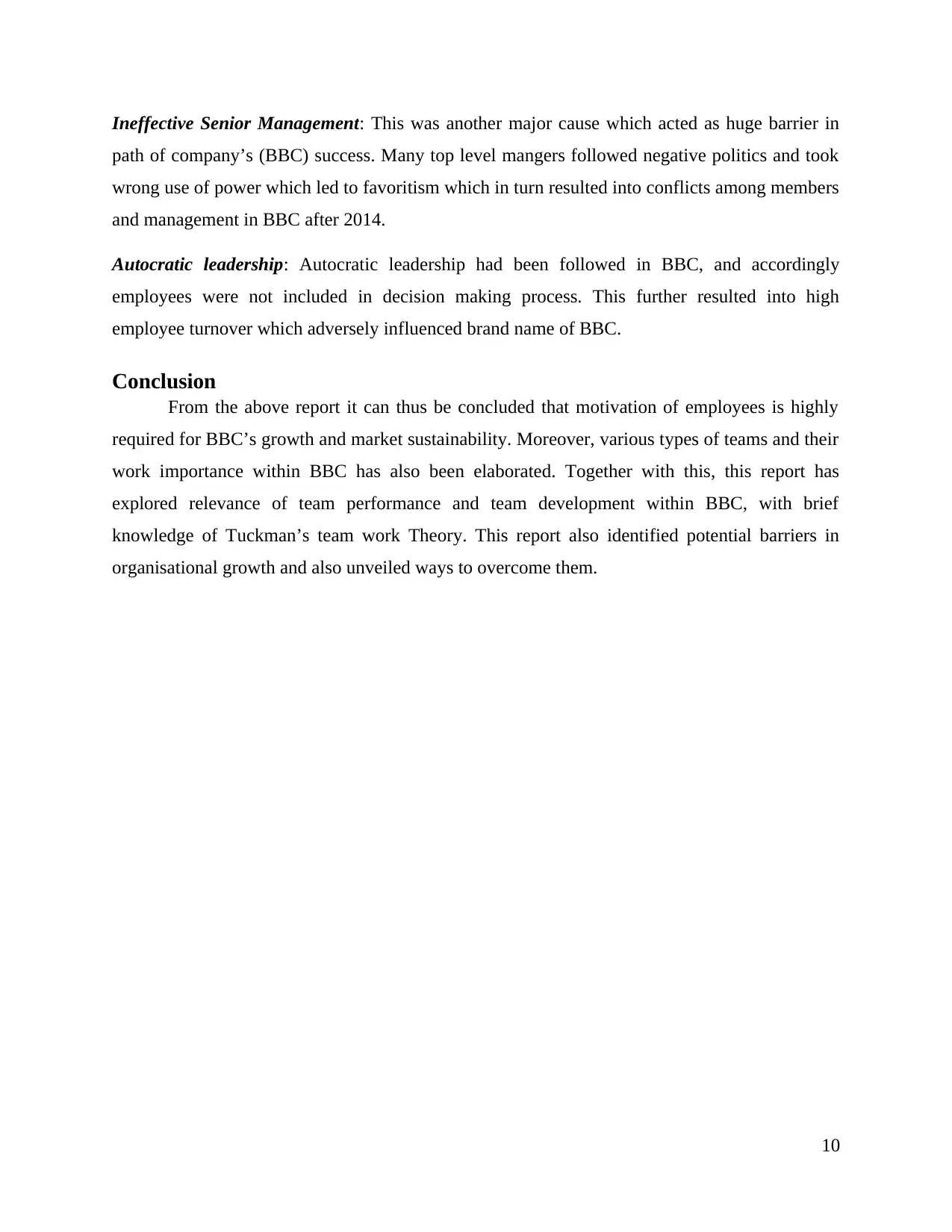
Ineffective Senior Management: This was another major cause which acted as huge barrier in
path of company’s (BBC) success. Many top level mangers followed negative politics and took
wrong use of power which led to favoritism which in turn resulted into conflicts among members
and management in BBC after 2014.
Autocratic leadership: Autocratic leadership had been followed in BBC, and accordingly
employees were not included in decision making process. This further resulted into high
employee turnover which adversely influenced brand name of BBC.
Conclusion
From the above report it can thus be concluded that motivation of employees is highly
required for BBC’s growth and market sustainability. Moreover, various types of teams and their
work importance within BBC has also been elaborated. Together with this, this report has
explored relevance of team performance and team development within BBC, with brief
knowledge of Tuckman’s team work Theory. This report also identified potential barriers in
organisational growth and also unveiled ways to overcome them.
10
path of company’s (BBC) success. Many top level mangers followed negative politics and took
wrong use of power which led to favoritism which in turn resulted into conflicts among members
and management in BBC after 2014.
Autocratic leadership: Autocratic leadership had been followed in BBC, and accordingly
employees were not included in decision making process. This further resulted into high
employee turnover which adversely influenced brand name of BBC.
Conclusion
From the above report it can thus be concluded that motivation of employees is highly
required for BBC’s growth and market sustainability. Moreover, various types of teams and their
work importance within BBC has also been elaborated. Together with this, this report has
explored relevance of team performance and team development within BBC, with brief
knowledge of Tuckman’s team work Theory. This report also identified potential barriers in
organisational growth and also unveiled ways to overcome them.
10
⊘ This is a preview!⊘
Do you want full access?
Subscribe today to unlock all pages.

Trusted by 1+ million students worldwide
1 out of 13
Related Documents
Your All-in-One AI-Powered Toolkit for Academic Success.
+13062052269
info@desklib.com
Available 24*7 on WhatsApp / Email
![[object Object]](/_next/static/media/star-bottom.7253800d.svg)
Unlock your academic potential
Copyright © 2020–2025 A2Z Services. All Rights Reserved. Developed and managed by ZUCOL.





